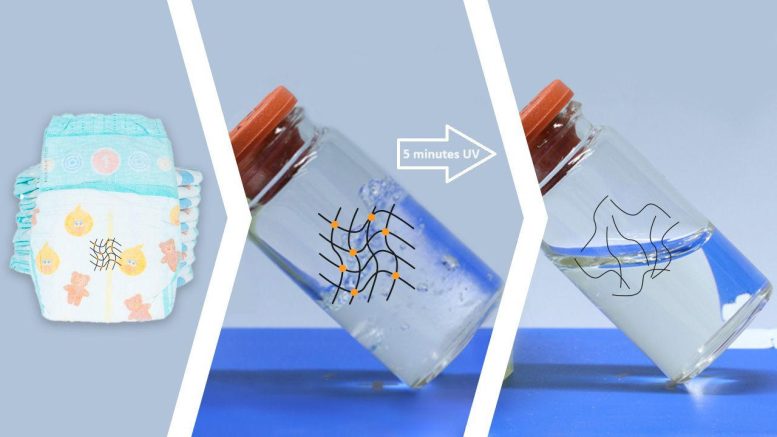
Water and UV radiation effectively and swiftly break down the crosslinked polymers in diaper liners without the use of any chemicals. This process allows the recycled plastic molecules to be repurposed for diverse applications.
Superabsorbent materials, like sodium polyacrylate, are key components in various hygiene and medical products, including diapers, bandages, and dressing materials. Typically, these crosslinked polymers, known for their high absorbency, are insoluble in water. Recycling them has traditionally necessitated the use of strong acids.
At high temperatures, they do not melt, but only degrade. The acids, however, “cut” the chains stabilizing the polymers after about 16 hours at 80 degrees Celsius and, hence, enabled recycling. This process is complex and expensive, which is why superabsorbers have hardly been reused. Annually, about two million tons of them end up in the trash or are incinerated.
Liquid in Five Minutes Instead of 16 Hours
Researchers from the Institute of Biological and Chemical Systems, the Institute for Biological Interfaces, and the Institute for Chemical Technology and Polymer Chemistry of KIT have now found that the crosslinked sodium polyacrylate polymers degrade under UV light after the uptake of water.
“The chains that link the polymers are broken by the light. Then, they are so loose that they swim in water and turn into liquid fibers,” Pavel Levkin, Professor at the Institute of Biological and Chemical Systems, explains. For their studies, the researchers cut out the liners from conventional diapers, wetted them with water, and exposed them to a lamp of 1000 W. After five minutes already did the solid material turned into a liquid that dropped into a collector. “This method with UV light is about 200 times faster than with acids,” Levkin says.
The Recycled Polymers Can Be Used in Various Ways
The team then used known processes to convert the liquid into new adhesives and dyes. “The observation that the substance is soluble and processible was of high importance. Most probably, it can be turned into many other products,” the scientist explains.
For their tests, the researchers used clean diapers. But it is also possible to separate the superabsorbers from used diapers. “Hence, there is no reason why close-to-reality use should not be possible,” Levkin says. The recycling method can be optimized ecologically at no cost by using solar power. “We have found a promising strategy for recycling superabsorbers. This will significantly reduce environmental pollution and contribute to a more sustainable use of polymers.”
Reference: “Diapers to Thickeners and Pressure-Sensitive Adhesives: Recycling of Superabsorbers via UV Degradation” by Shuai Li, Johannes M. Scheiger, Zhenwu Wang, Birgit Huber, Maxi Hoffmann, Manfred Wilhelm and Pavel A. Levkin, 7 September 2023, ACS Applied Materials & Interfaces.
DOI: 10.1021/acsami.3c06999